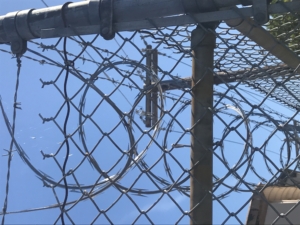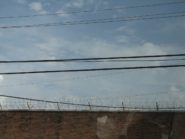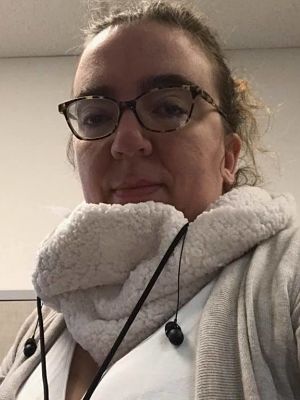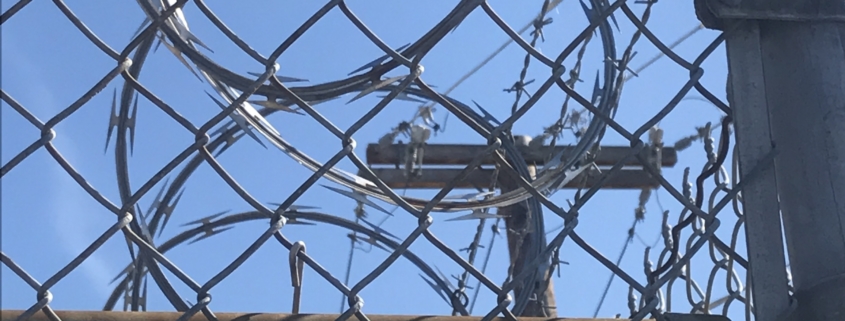Reaching Out for Incarcerated Voices
When you walk in the doors of a prison, you can’t help but be reminded that in order to leave, someone has to let you out. You are reminded by the big thick doors. You are reminded by the double paned glass. You are reminded by the tall gates outside. You’ve left everything in your car but your keys and your ID. You have to sign in and go through a metal detector.

I’ve been to a number of prisons and detention centers for youth, having spent many years working with foster youth who were in and out of juvenile detention. I’ve picked up kids who were being released from detention, gone to visit them while in detention numerous times, and testified in court to try to get them out. I’ve never become used to it; incarceration is one of the most unnatural states that exist.
The staff of Lunch Ticket recently had a conversation about how we, as the journal of a school with a social justice mission, could feature a more diverse group of voices. When the idea of doing outreach to incarcerated populations came up, I volunteered. I think any opportunity for incarcerated individuals to tell their stories gives us all a little bit of hope. Hope that they will be seen as people. Hope that writing, and being published, will give them new ideas about their futures. Hope that our country will someday shift from being a leader in mass incarceration to being the leader of freedom and free peoples.
On behalf of Lunch Ticket, I visited a maximum/medium security facility for young men about forty minutes from my house. To be there, young adults must either have committed a large number of minor offenses or one major offense: a range from petty theft to large-scale drug sales and assault. Out in the country, the facility has a rural feel to it. There are wide expanses of grassy green fields within the high gates. The facility is called a school, a name that implies something softer than prison; but the gates, the security, the metal detector, and building do not. They disrupt the illusion.
* * *
I went to the facility with a program called Gateways for Incarcerated Youth, which is run out of the Evergreen State College. The Gateways Program Coordinator, Talib, agreed to be my host, and to facilitate any writing or art submissions that the youth may decide to submit to Lunch Ticket.
I sat down with about ten young men, Talib, and a couple volunteers. The first thing I noticed was Talib walking around to each of the young men to shake their hands. He looked them in the eye in greeting. The second thing I noticed was that most of the incarcerated youth were people of color, and aside from Talib, all of the people in power were white.
The room looked like a school cafeteria, with posters on the wall and long tables with plastic chairs. A white man sat behind us at a large elevated desk. I could see a young man being escorted by a guard outside. Most of the youth sat, but one stood and braided another’s hair while we talked. They were all casual, chatty, and engaged.
We introduced ourselves, talked about how our weeks had been, and said what our favorite things about summer were, which included the weather, summer carnivals and fair food, water parks, and hanging out with friends. They were at once dreaming of summer activities before incarceration, and about what they might do when they got out. Talib explained my reason for being there, and I talked about the different kinds of work they could submit to Lunch Ticket. I talked about CNF, fiction, flash fiction, Young Adult, and art. I told them I thought they were in a great position to write: the fact of where they live means they have stories to tell that other people could learn and benefit from. They could open up readers’ eyes to an experience that so many people cannot even imagine. I told them that there were nonfiction writers in the world who wrote memoirs about lives that didn’t interest me at all, but that their lives did.
I asked if it was okay with them that I write a blog about my visit, because maybe that would mean someone else would read it and want to do the same thing I did. I could see in their faces that they liked that idea—they lit up, nodded, and smiled at me—but just a little. One young man didn’t smile when he nodded. He looked like he was thinking, yeah that’d be nice. It reminded me of my first conversation with Talib, when I’d said that I hoped they would respond positively to my visit, and Talib had replied that they respond positively to everyone who takes an interest in them.
When it was time for questions, they had some for me. They asked why the journal was only online, if they were allowed to submit more than one piece, and if they didn’t get accepted for this issue, if they could try again for the next one. They asked if their names would be on their piece if it were to be published. They asked me to explain flash fiction. They asked if I would bring in a printed copy of the journal, because they don’t have access to the internet.

Talib had talked to them the week before to prepare them for my visit, and they’d told him they were worried that they didn’t have anything to write about. He’d responded that he knew they did, and then they’d talked about not letting the place they were in crush their creative spirit. Because it does that. To help them with inspiration, he brought a movie with him about Nelson Mandela called Mandela: Long Walk to Freedom. He asked them to produce something creative—anything—in response to the film. They may use their work to submit to Lunch Ticket or not, but this was their task for the week as part of their program.
When it was time for me to leave, they thanked me for coming. I told them I was available to answer any questions about their writing, or to help them with it, or to answer questions about Lunch Ticket. I explained that I work for the government as my day job, and that I needed to take vacation time to come see them, but that if they wanted me to come back because they were interested in writing, I absolutely would.
I waved to them as I walked out, and their expressions were so positive. They looked like they had light in their eyes. They said they were going to submit their work. I don’t know how they felt, but I walked away with hope. I had hope even as I returned my visitor’s badge to the man behind several plates of glass. I had hope even as I waited for the door to open for me, and then for the gate to open for me. I had hope as I drove away, past the tall gates and the large green fields, and headed back onto the freeway for home.
* * *
The school’s population is overwhelmingly youth of color. I thought about this when I was recently pulled over by a police officer who was all about order. As a middle aged white woman, I am used to authorities speaking to me with a certain amount of respect, especially since I live in a small community where many of us know each other. But this officer demanded to see my license before he would tell me why he had stopped me; he asked me to be honest and tell him if there were any warrants for my arrest or if I had a firearm in my car.
I haven’t been asked questions like that in maybe twenty years, and I was taken aback. I had flashes of anxiety as he talked to me, and as I pulled my wallet out of my bag. I reminded myself that nothing bad was going to happen to me. I knew that because I have privilege, and resources, and security. And so I did not give him my license until he told me why he’d pulled me over. And he did, begrudgingly. His tone changed once he confirmed that my license was clear and that my paperwork lined up. He decided I was safe: a middle class, middle aged white woman who he could cheerfully and patronizingly lecture to about remembering that my birthday meant it was time to renew my car registration, that I should give myself car tabs for my birthday. I tried not to roll my eyes, only because I didn’t want him to give me another ticket for not having my most recent insurance paper. I reached into my bag to get my lip balm while he talked, without warning him ahead of time. He didn’t ask what I was getting. My hands started to shake a little when I thought about what could’ve happened to me had I done that if I were a person of color.
Minor offenses pile up easily. Once you are in the system there are eyes on you, and it’s easy to get picked up again and again. Today I am forty three years old. Twenty five years ago I was a pot smoking school ditching teenager. I never got involved with the system because I’m white, I have educated parents, and come from a safe neighborhood. I was safe.

Former Washington State marijuana activist Dominic Holden wrote in The Stranger in 2012 about one of the saddest lessons of his political life. He was running a struggling campaign to decriminalize marijuana based on what he saw as a great injustice: that white people used marijuana at a higher rate than people of color, but that people of color were arrested for possession in much higher numbers. Holden and some fellow organizers went to Blair Butterworth, the late Seattle political consultant, for advice on how to proceed. Butterworth told them that if they wanted to win, they should stop talking about race and stick to this message: “I-75 frees our police and prosecutors from enforcing marijuana laws so they can concentrate on protecting our communities from serious and violent crime.” It worked. The law passed, making pot the “lowest ‘priority'” for police, and arrests started declining. Marijuana is now legal in Washington, but not for young people. They can still be arrested for it, among many other petty crimes, including those that poor teenagers commit to survive, and wealthy teenagers commit because they are kids and they can.
* * *
I wrote most of this essay before the nation reeled from events in Charlottesville, Virginia. We are now more aware than ever of the presence of angry neo-Nazis, who are filled with fear of that which is different than them. They are filled with fear of disappearing and choose to take that fear out on other people. If I were an incarcerated young man of color, I would also be afraid of disappearing. I would be afraid that no one would ever notice my experience, who I am, or what I deserve to have in life. I have been thinking every day of the young activist who said that as he stood in front of the Nazi marchers in Charlottesville, he wondered to himself something like, am I doing this right? Is this what Dr. Martin Luther King would have done?
I hope I am doing this right, too, in my quiet small-town way. I don’t know the incarcerated youth I met. I can only imagine that they have felt for most of their lives the fear and anxiety I felt with that police officer. I have no idea what those young men were in for, what crimes they may have committed. I have no idea what’s been done to them. But if they want to write—I have hope. I hope telling their stories will help them see themselves as people whose stories deserve to be told. I hope some of everyone’s fears dissipate. I hope other people will read their stories and remember that incarcerated people are real humans, who could be them.
And they do want to write. Talib tells me that several of the young men have pieces ready to submit already. This gives me hope that the arc of history will bend towards justice in my little corner of the world.
 Emma Margraf is a writer who lives in Olympia, Washington, works for the state government, and writes for several local publications in the South Sound. She has been published in Manifest Station and is a candidate for an MFA at Antioch University Los Angeles.
Emma Margraf is a writer who lives in Olympia, Washington, works for the state government, and writes for several local publications in the South Sound. She has been published in Manifest Station and is a candidate for an MFA at Antioch University Los Angeles.





